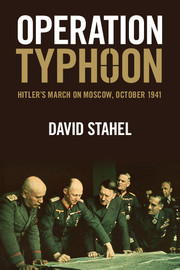Book contents
- Frontmatter
- Contents
- List of illustrations
- List of maps
- List of tables
- Acknowledgements
- Glossary
- Tables of military ranks and army structures
- Introduction
- 1 Contextualising Barbarossa
- 2 Operation Typhoon
- 3 Viaz'ma and Briansk
- 4 Carnage on the road to Moscow
- 5 Bock's final triumph
- 6 Exploiting the breach
- 7 Weathering the storm
- 8 Running on empty
- 9 The eye of the storm
- Conclusion
- Notes
- Bibliography
- Index
1 - Contextualising Barbarossa
Published online by Cambridge University Press: 05 March 2013
- Frontmatter
- Contents
- List of illustrations
- List of maps
- List of tables
- Acknowledgements
- Glossary
- Tables of military ranks and army structures
- Introduction
- 1 Contextualising Barbarossa
- 2 Operation Typhoon
- 3 Viaz'ma and Briansk
- 4 Carnage on the road to Moscow
- 5 Bock's final triumph
- 6 Exploiting the breach
- 7 Weathering the storm
- 8 Running on empty
- 9 The eye of the storm
- Conclusion
- Notes
- Bibliography
- Index
Summary
Hunting the Bear – campaigning in the Russian theatre
While there are countless conceptual topics of relevance to our understanding of Germany's war in the east, Carl von Clausewitz's (1780–1831) interpretation of ‘the country’ (or countryside) as a strategic factor in the conduct of war is probably the most efficient method of linking many related problems inherent to Hitler's Ostheer in 1941. ‘The country’ is dealt with in On War's Book I, ‘On the Nature of War’. Clausewitz writes:
The country – its physical features and population – is more than just the source of all armed forces proper; it is in itself an integral element among the factors at work in war – though only that part which is the actual theatre of operations or has a notable influence on it.
It is possible, no doubt, to use all mobile fighting forces simultaneously; but with fortresses, rivers, mountains, inhabitants, and so forth, that cannot be done; not, in short, with the country as a whole, unless it is so small that the opening action of the war completely engulfs it . . .
In many cases, the proportion of the means of resistance that cannot immediately be brought to bear is much higher than might at first be thought. Even when great strength had been expended on the first decision and the balance has been upset, equilibrium can be restored.
It is important to remember that any discussion of these problems cannot be rendered valid or invalid based simply on any particular historical example; after all, even if Clausewitz is correct, there may well be exceptions to the rule. In other words, simply applying Clausewitz to the German experiences in 1941 is not enough to show a pattern of experience which proves or disproves the problems of the Russian theatre. Thus, in order to gain a more dependable sample, a measure of historical digression is required.
- Type
- Chapter
- Information
- Operation TyphoonHitler's March on Moscow, October 1941, pp. 9 - 53Publisher: Cambridge University PressPrint publication year: 2013



